Work Packages & Deliverables TRANSiTION
Read our official project deliverables and explore our findings
Deliverables are the outputs that are produced during the lifetime of an EU-funded project and detail the results of the project activities. Here you can follow the current status of TRANSiTION.
Work Package 1 - Bringing the Team Together
Project Management and Coordination
Status: Ongoing
Leader: Cyprus University of Technology (CUT)
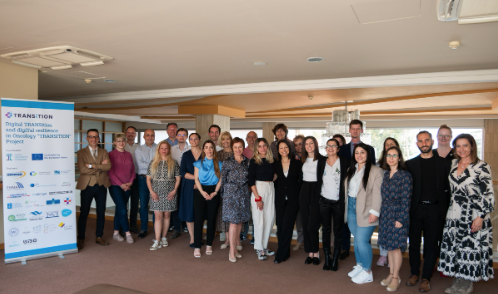
The kick-off event on 4-5 May in Limassol led to the beginning of the TRANSiTION project, and the start of Work Package 1. Led by the Cyprus University of Technology, it aligned all consortium activities with project goals and provided consistency across all work packages.
It also focused on maintaining high-quality outcomes, addressing ethical and legal considerations, and managing project risks, while providing an interface to EU services and external actors.
Work Package 1 presented four deliverables to prepare the project's implementation: a project management plan (PMP); a Log Frame Matrix (LFM); a Quality Assurance Plan (QAP); and a Data Management Plan (DMP).
The Work Package 1 Team has also boosted it's efforts to engage in several meetings and events, including:
On 19 February 2024, the TRANSITION Steering Committee met to review the outcomes of its workshop in Barcelona, discussing the trajectory of the project and aligning on ways to enhance the quality of project materials.
Later, on 27 February 2024, a high-profile Awareness Event spotlighting two pivotal EU-funded projects, INCISIVE and TRANSiTION, unfolded both in-person at the Cyprus University of Technology and virtually. This gathering provided a platform for project leaders and researchers to elucidate the breadth and aspirations of the projects, offering stakeholders a comprehensive update on module development progress. The event raised awareness among relevant stakeholders in Cyprus, other member states and beyond. The session wrapped up with a fruitful Q&A, which invited attendees to share their visions and feedback on digital skills training for cancer professionals.
And on 10 April 2024, Prof. Andreas Charalambous presented the TRANSiTION project as part of a seminar "The Role of Technology in Cancer Patient Care," co-organized by the Center of Excellence CYENS and Europa Donna Cyprus, in the presence of experts and figures, such as Ms. Stella Mastora, President of the European Federation of Europa Donna, and Constantinos Giorkatzis, Mayor of Nicosia and President of the Administrative Board of CYENS Center of Excellence’.
Work Package 2 - Building Upon our Predecessors' Work
Current Status and Challenges in Digital Health Utilisation and Optimisation
Status: Completed
Leader: Cyprus University of Technology (CUT)
Work Package 2, also led by the Cyprus University of Technology, had the goal of understanding already existing programmes for digital skills training for cancer care professionals across Europe. To do this, the team explored existing training programmes in digital literacy skills for healthcare professionals dealing with patients throughout the cancer continuum.
The TRANSiTION team developed an evidence-based guide for health workers, focusing on cancer care and mapped these programmes. This research served as an overview of already developed projects for digital skills training for cancer care professionals.
It presented four deliverables which explored content, available tools, and a list of existing programmes:
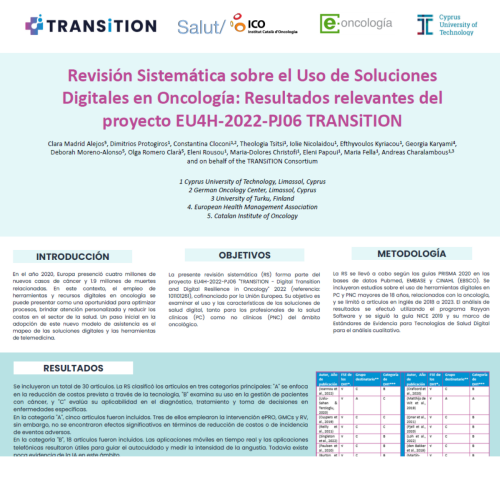
- a systematic review of digital solutions in the field of oncology;
- a second review;
- a Digital Health Tools Guide; and
- a mapping of existing training programmes.
A poster was also made, compiling the conclusions of the systematic review. It was presented at Tendiendo Puentes 2023, the Congress of Medical Oncology, Haematology, and Oncohaematology Pharmacy.
View the poster here.
Work Package 3 - Finding out what Cancer Professionals Actually Need
End-users Needs Analysis and User Requirements
Status: Completed
Leader: Servizo Galego de Saude (SERGAS)
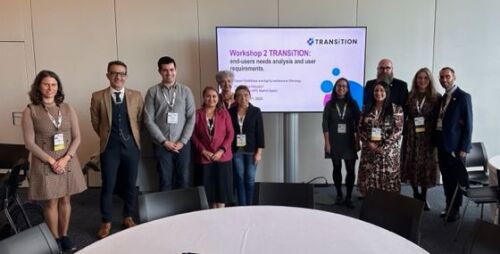
Work Package 3 started in June 2023 and was led by the Servizo Galego de Saude (SERGAS). Although this Work Package is divided into four tasks, the team has found it easier to classify it into two workstreams.
The first workstream developed a Delphi survey to address the digital training needs and online resources available for three target groups: clinical professionals in cancer care; non-clinical professionals in cancer care; and cancer patients and carers.
In the second workstream, the team held workshops in Limassol, Madrid, and Vigo to highlight the complex challenges, barriers, and gaps identified in the needs assessment. It also prioritised a series of mobile apps selected in Work Package 2. The aim of this workstream was to guide development of the training modules to be created during Work Package 4.
You can now watch the TRANSiTION Webinar "Cancer Care in the Digital Age: Challenges and Ongoing European Research", which is the TRANSiTION workshop carried out in Vigo.
The Consortium, under the leadership of SERGAS, has conducted extensive research on training needs and online resources available for three target groups: clinical professionals in cancer care; non-clinical professionals in cancer care; and cancer patients and carers.
This survey was featured in Limassol, Madrid, and Vigo to highlight the complex challenges, barriers, and gaps identified in the needs assessment.
Now, the team has developed a policy brief which brings together the conclusions of their work. It is an analysis of the current needs and knowledge of clinical and non-clinical (i.e. health managers) professionals involved in cancer care, as well as cancer patients/caregivers. It also explores the benefits, barriers and enablers of digital tools and the digital world.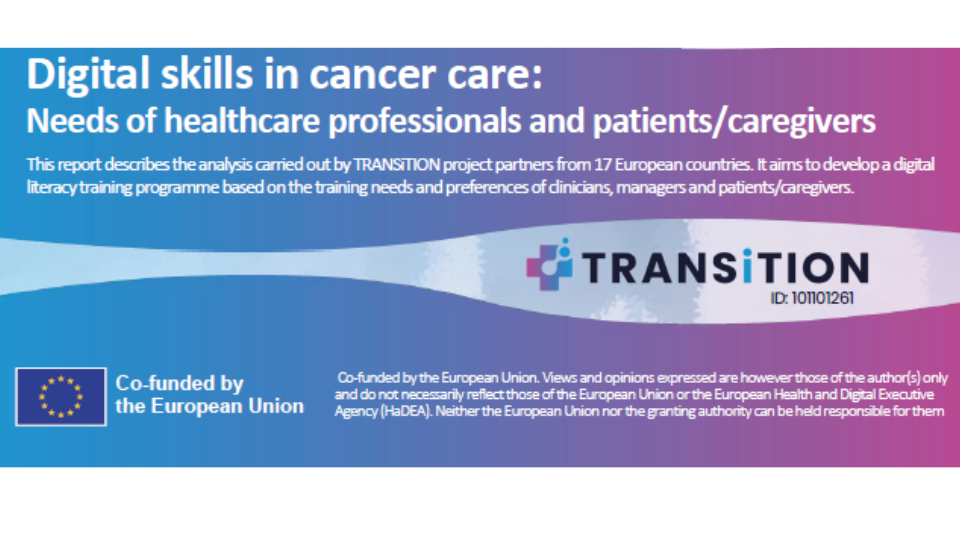
The TRANSiTION project policy brief outlines the critical need for comprehensive digital skills training in oncology care, emphasizing the importance of patient empowerment and security. The analysis, conducted across 17 European countries, reveals that both clinical and non-clinical professionals require significant improvement in digital competencies, particularly in digital communication and security. The brief highlights the necessity of a self-guided online course with a user-friendly interface to address these needs. It also underscores the importance of digital equity, addressing disparities between urban and rural areas and among different age groups. Ultimately, the successful integration of digital tools in healthcare hinges on mutual agreement between patients and healthcare professionals, ensuring these tools complement rather than replace traditional care methods.
You can read the full document here!
Enhancing Digital Competence in Oncology: Dissemination of Posters
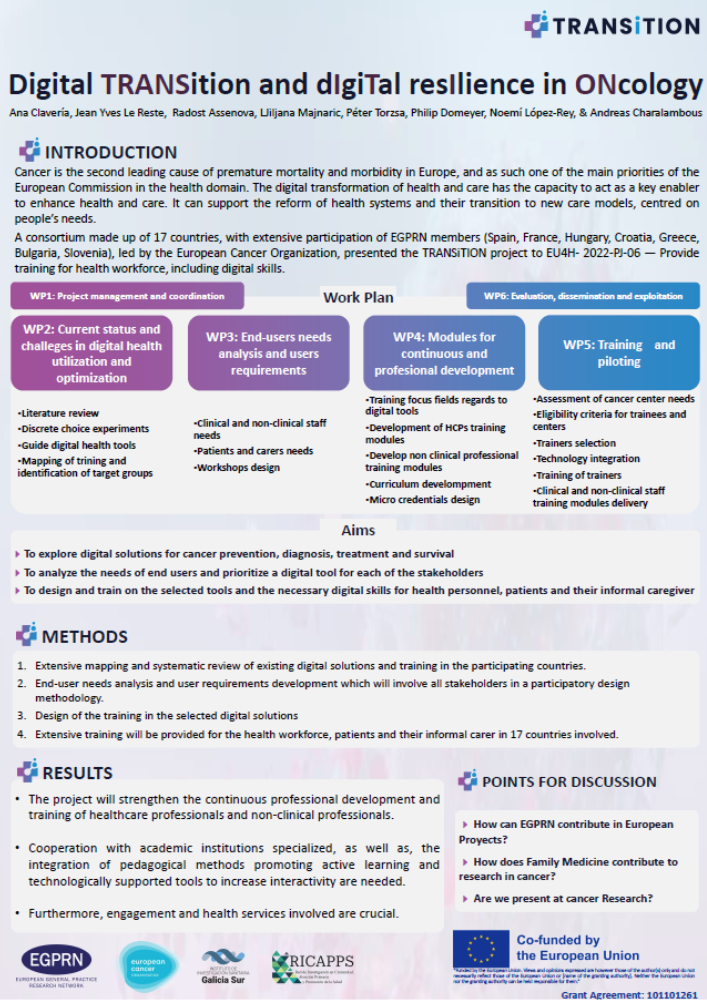 |
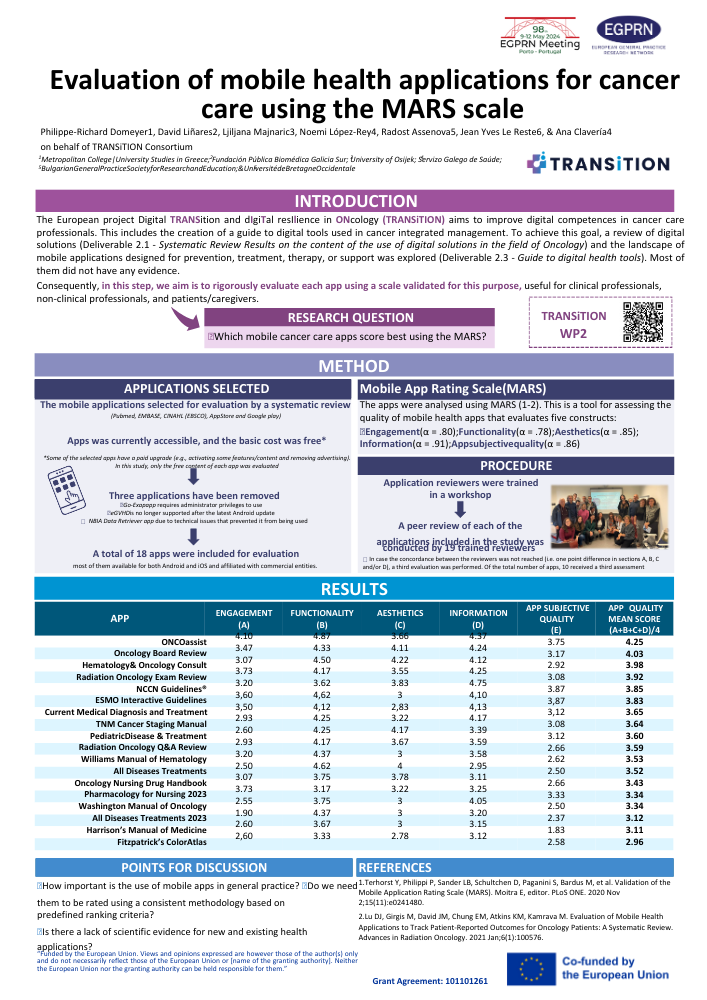 |
Our colleagues from SERGAS also presented two key posters from the TRANSiTION project at the European General Practice Research Network (EGPRN) meetings. They provide a comprehensive overview of the project's scope and findings.
The first poster underscores TRANSiTION's aim to enhance continuous professional development and training for both healthcare and non-clinical professionals in oncology.
To achieve this, the project emphasizes cooperation with academic institutions and the integration of active learning pedagogical methods supported by technology. The methodological approach involves extensive mapping and systematic reviews of existing digital solutions, end-user needs analysis, and the design and implementation of tailored training programmes. The ultimate goal is to support the digital transformation of healthcare, promoting new care models centred on patient needs.
You can download the poster here!
The second poster, 'Evaluation of Mobile Health Applications for Cancer Care Using the MARS Scale,' delves into the critical assessment of mobile health applications designed for oncology care. Using the Mobile App Rating Scale (MARS), the researchers evaluated the quality of 18 selected apps across five constructs: engagement, functionality, aesthetics, information, and subjective quality.
This comprehensive evaluation revealed that while some apps, such as ONCOassist and Oncology Board Review, scored highly, there is a significant lack of scientific evidence supporting many existing health applications. The study highlights the necessity for a consistent methodology to evaluate mobile health apps, ensuring they meet predefined ranking criteria and provide reliable support for clinical and non-clinical professionals, as well as patients and caregivers.
The findings from these posters suggest a transformative potential for the integration of digital tools in oncology care. By rigorously evaluating and implementing these tools, the TRANSiTION project aims to equip healthcare professionals with the necessary digital competencies to improve patient outcomes and streamline cancer care processes.
As the project progresses, it continues to gather valuable insights from stakeholders across 17 countries. The collaboration and extensive participation of EGPRN members underscore the project's commitment to fostering a digitally competent health workforce capable of meeting the evolving challenges of modern oncology care.
You can download the poster here!
Work Package 4 - Building the Curriculum!
Module Continuous and Professional Development
Status: Ongoing
Leader: Fundació per a la Universitat Oberta de Catalunya (FUOC)
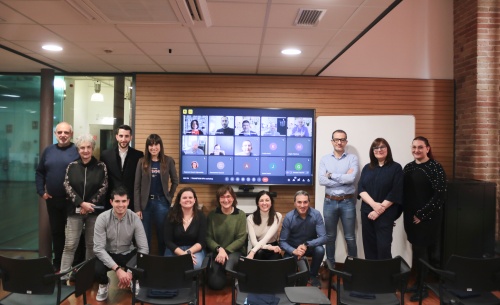
WP4 is focused on crafting the TRANSiTION curriculum and its accompanying materials. On 16 February 2024, the TRANSiTION team visited Universitat Oberta de Catalunya in Barcelona to conduct a hybrid workshop involving all key stakeholders and project partners.
The primary objective of this workshop was to facilitate an inclusive discussion among participants, showcasing progress made in curriculum development and gathering feedback from end-users. This collaborative session proved invaluable in gaining insights to further refine our work.
Following the workshop, the curriculum underwent a thorough review process, resulting in the completion of its revision. The finalized version was then shared with all project partners.
Partners involved in the curriculum have made a great effort over the last months in order to develop the programme materials.
The full curriculum and all materials have been developed and resulted in a total of 11 modules and 38 sub-modules. They are divided in different pathways, depending on the profile of the professional completing the course. To these, we can also include the Train the Trainers module, which is composed of 3 sub-modules.
The final task is ongoing, and the content has been submitted for accreditation of both medical doctors and nurses to ensure participants receive CME credits and microcredentials.
Work Package 5 - Giving it a Go
Training and Piloting
Status: Ongoing
Leader: Institut Catala d'Oncologia (ICO)
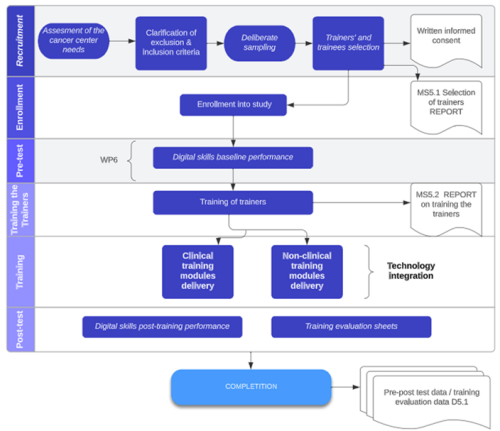
The Institut Catala d'Oncologia (ICO) is leading the Consortium in the development of Work Package 5 (WP5), spearheading the rollout of training initiatives for clinical and non-clinical professionals within the TRANSiTION project.
WP5 is assessing the needs of cancer centres participating in the programme. To facilitate this, the team has prepared a document for WP partners to nominate a minimum of three potential cancer centres for assessment and subsequent training. Simultaneously, they are crafting a comprehensive questionnaire using qualitative and quantitative methods. The questionnaire will delve into curriculum evaluation, resource requirements, and the eligibility criteria guiding the selection process.
In addition, preliminary criteria have been outlined for both centres and trainers. For centres, factors such as relevance to oncology care, dedication to participant support, and technological preparedness are considered. Similarly, trainer criteria include diverse backgrounds, commitment to professional growth, and proficiency in digital health. Furthermore, parameters for trainees have been established, including age, consent, employment status, language proficiency, and internet accessibility.
In preparation for the training course, the team has identified the necessary number of trainers and trainees, factoring in a projected dropout rate by oversampling enrolment by 20%. Moreover, the course will be offered in 12 languages in addition to English.
Emphasizing an innovative approach, the WP5 leaders advocate for integrating Performance Learning Activity (PLA) design principles into the training methodology. This strategy ensures contextual relevance and enhances engagement by tailoring training activities to real-world challenges, thereby optimizing learning outcomes.
The team also focuses on the delivery platform, with plans to leverage the e-oncology Moodle platform. Administrative responsibilities for the setup and management will be spread among respective partners, ensuring seamless operation and robust support for both learners and trainers throughout the programme.
Work Package 6 - Getting the Word Out There
Evaluation, Dissemination and Exploitation
Status: Ongoing
Leader: European Cancer Organisation (ECO)
Just like Work Package 1, Work Package 6 is transversal and implemented across the entire TRANSiTION project. It consists of dissemination and communication activities, with the goal of keeping the relevant stakeholders informed, involved, and engaged.
Led by the European Cancer Organisation (ECO), Work Package 6 maximises visibility of the project and promotes results through ambitious communication activities. These activities will be frequent throughout the project.
Work Package 6 has three activities, including the Dissemination and Communication Plan, which has been submitted to the EU Projects Portal. This plan maps the list of project stakeholders and present the available to best communicate the relevant milestones and information with them. For that, a combination of website, social media and traditional approaches will be put together, offering an integrated communication approach to the TRANSiTION strategy.

Co-funded by the European Union. Views and opinions expressed are however those of the author(s) only and do not necessarily reflect those of the European Union or the European Health and Digital Executive Agency (HaDEA). Neither the European Union nor the granting authority can be held responsible for them.

